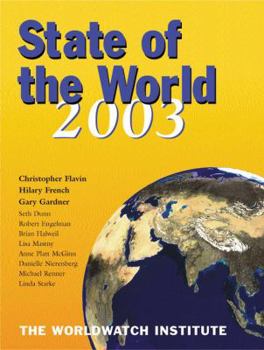Book Overview
Written in clear and concise language, with easy-to-read charts and tables, State of the World presents a view of our changing world that we, and our leaders, cannot afford to ignore.
Format:Paperback
Language:English
ISBN:0393323862
ISBN13:9780393323863
Release Date:January 2003
Publisher:W. W. Norton & Company
Length:256 Pages
Weight:0.90 lbs.
Dimensions:0.7" x 7.0" x 9.4"
Customer Reviews
2 ratings
Excellent information
Published by Thriftbooks.com User , 20 years ago
Established as one of the most authoritative annual guides to progress towards a sustainable future, the 20th edition of the 'State of the World' provides chapters on:- a review of the year- the challenges we face- the rapid decline on the global bird population with 12 recommendations toward a sustainable future for birds and biodiversity- the link between population, women, and biodiversity with four principles for integrated programs- the growing threat of Malaria with 10 essential strategies- new and sustainable energy technologies with eight points for forging a new energy future- the destructive effect of mining- uniting divided cities and - engaging religion in the quest for a sustainable worldIn his speech opening the World Summit on Sustainable Development in Johannesburg in August 2002, President Mbeki drew on South Africa's precipitous overturning of apartheid as an example of the very rapid progress the world needs to make in combating the challenges before us. If Rio in 1992 provided the long-term road map for the creation of a sustainable world, Johannesburg marked a shift to modest concrete plans of action, building on the Millenium Development Goals agreed by Heads of State in 2000. The substantial involvement of NGOs, committed to social betterment, environmental progress and economic opportunity is accelerating the process of global change by bringing fresh ideas, imposing new pressures, and by setting up voluntary codes of conduct. NGOs are filling the gap left by governments and their activity may lead to alliances between governments, NGOs, and UN agencies similar to the 280 partnerships agreed in September 2002. Growing inequality is one of the most disturbing global trends forcing developing countries to assume a bigger role in setting the international agenda. We have one or perhaps two generations in which to reinvent ourselves and overcome the five major threats: increasing numbers of people who lack the means for a decent life; increasing carbon emissions; risks from toxic chemicals; invasions of species carried in ballast water, packaging, wood products, and crop shipments; ecological decline. Despite the obvious need to change and despite our technical competence, fundamental change appears to be only a remote possibility. But there are success stories such as the eradication of smallpox and stabilizing world population. A few years ago population was increasing by about 90 million per year and it is now 77 million annually, partly due to AIDS but partly due to rapidly declining birth rates in countries like Iran. Organic farming is now the fastest growing sector of the world agricultural economy, while wind and photovoltaic generating capacity is increasing by about 25% pa. There is growing support for the concept that we must reintegrate the head and heart of society and reestablish spirituality as a partner in dialogue with science. To accomplish this, the two groups will need to surmount the suspicion and misu
Interesting, timely information
Published by Thriftbooks.com User , 21 years ago
I bought this book for a course, but I found it very easy to read and very interesting. They keep everything up-to-date so it's best to buy the book when it first comes out (at the beginning of the year). By the time the end of the year comes around, the book loses its power, and you need the new year's edition. But I would buy it again, it is a great source of information.






